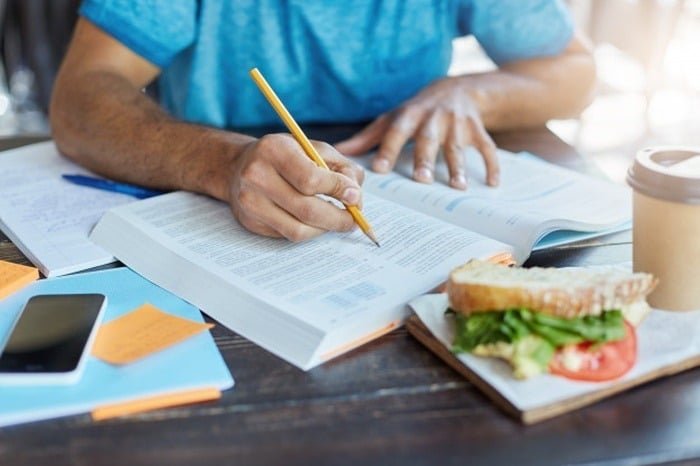A Guide to Becoming a Better Student
If you’re worried about your grades and academic success, you can work on your study skills. Effective studying helps improve your scores. Plan your study time and use the appropriate strategies outlined in this section ofSelMagzand focus on being active in class.
If you study practically, you won’t need to spend all your time studying.
Have specific rituals for studying
To achieve this goal, follow these steps:
Create a suitable study space for yourself
Studying in a specific place helps your brain associate that space with study time. So, whenever you’re in that spot, you’ll feel more focused on studying, making the task easier for you. This method prevents you from wasting valuable time finding a good study space each day.

Study in a distraction-free place
Choose a place away from distractions like television or other noises. A location with a desk where you can sit and work is ideal. Avoid studying on your bed or couch. Make sure the place suits the task at hand, as studying for an art project is different from studying a textbook.
The best study place for you depends on your learning style. For example, if you have a good visual memory, working in a well-lit space with diverse colors can be beneficial.
Stick to a study schedule
Once you have your study space ready, plan your study sessions. Having a schedule helps you avoid procrastination and wasting time. It’s best to start planning at the beginning of the term so you won’t be rushed at the last minute.
Prioritize your studying
Set your study time before extracurricular activities or social events. Try to study soon after class or school.

Have a consistent daily schedule
Try to study at the same time every day. This will help organize and create a routine for your studying.
Start slowly
Begin with study sessions lasting between 30 to 50 minutes, and once you get used to that duration, you can gradually extend it.
Take breaks regularly
Studying for long hours can cause stressso take 10-minute breaks during your studying sessions. Avoid studying for more than 2 hours without a break.

Set specific goals for each study session
Identify a goal for each of your study hours. Studying without a clear target is ineffective, so start each session knowing exactly what you aim to achieve by the end.
Define your overall goal
Keep your main objective in mind to stay focused on what matters. Break it down into smaller parts to cover in each study hour. For instance, if you need to memorize 100 English words for a test, plan to learn 20 words per session over five study sessions.
Create and practice good study habits
To establish good study habits:

Test yourself
One of the most vital parts of studying is repetition. During each study session, continuously test your knowledge. Create flashcards for words, dates, and other information and use them to quiz yourself.
If you have a math exam, work on problems from your workbooks. If your teacher provides sample questions, try to complete as many as possible. Design a test for yourself with 10 to 20 questions similar to those from previous exams and then complete it.
Repeat the teacher’s exercises
If your teacher has solved exercises in class, redo them. Start early and show your teacher your exercises. Tell them you did these activities to prepare for exams and ask for guidance on whether your approach is helpful.
Begin with the most challenging topics
Hardest subjects require the most mental energy, so start with them. After that, learning easier topics will feel much less stressful.

Form study groups
Having study groups can maximize your efficiency and keep you motivated, but make sure to collaborate correctly for it to be effective.
As always, don’t forget to plan
For group studying, just like individual studying, you need a precise plan. Set a goal for each study period and include breaks as well. The risk of distractions while studying with others is high, and planning helps maintain your focus.
Surround yourself with hardworking individuals
Select study partners who are known for their work ethic because no amount of planning can compel lazy individuals to study.

Don’t hesitate to ask for help when you need it
Don’t be embarrassed to seek help. If you’re struggling with a specific topic despite your best efforts, ask another student, a teacher, or a family member for assistance. If you’re a college student, there may be study groups available in different subjects to help you.
Don’t forget to take breaks
Include break times in your schedule and reward yourself. Since studying is a daily task, taking breaks and rewarding yourself can motivate you to study harder.
About every hour, take a break and do something you enjoy. Also, if you’ve studied for three consecutive days, treat yourself to a meal out on the fourth day.
Study smart
Remember that studying intelligently will yield better results, so:

Prepare your mind and body before studying
If you dive into studying right after school, you might feel very tired and have trouble focusing. Take some time to rest and prepare your mind to make studying more effective.
Take a shortwalkbefore you start studying, and stretch your muscles. This helps relax your body and clear your mind, making you ready to study.
Eat a healthy snack
If you’re hungry, have a light snack to avoid hunger pangs but don’t eat something that makes you drowsy.
Approach studying with the right mindset

Try to maintain a positive attitude towards studying, as it significantly impacts your study effectiveness.
Think positively while studying
Remember, you’re increasing your skills and knowledge. If something is too difficult, don’t get discouraged. Remind yourself that you’re growing and learning new things, so it’s normal not to grasp everything right away.
Avoid catastrophizing or all-or-nothing thinking
Catastrophizing thoughts include ideas like: “If I don’t learn this now, I’ll never learn it.” All-or-nothing thinking includes thoughts like, “I always do poorly on my tests.” Instead of these thoughts, try to stay realistic. Tell yourself that you might be struggling with this concept, but if I persist, I will eventually understand it.
Don’t compare yourself to others

You are studying for yourself; the success or failure of others should not matter to you.
Use memory games
Memory games or mnemonic devices actually involve memorizing information by creating associations. This method is both helpful and effective. Many people remember content by connecting words into a sentence.
The first letter of each word can remind them of something they need to memorize. For example, in the sentence: “My uncle posted my empty envelope.” The first letters of each word represent the classification of vertebrates: amphibians, birds, fish, and mammals.
The memory devices you use should be easy to recall. If you create them, feel free to use phrases that are meaningful and personal to you.
Rewrite your summaries
If you take notes, rewrite them. This helps you engage with the material again and explain it to yourself.
Don’t forget to summarize

Don’t just copy from your previous notes. Try to summarize them further, leaving only essential points.
Value your time in class
To make the most of your time in class, do the following:
Take good notes
The notes you take during class are a valuable resource when you study alone.
Organize your notes

Arrange your notes by date and subject. When noting down information, write the date at the top, and create headings based on the lessons being taught so that you can easily find the topics later.
Write legibly
Write neatly so that you won’t have difficulty reading them later.
Compare notes
Compare your notes with those of classmates to fill in any gaps you may have missed.
Read actively

When you read study material, do so actively. The better you read, the more you’ll remember.
Separate main and supporting details
Pay attention to the main and supporting titles in each section. These usually indicate the critical points that you need to learn. The first sentence of each paragraph typically summarizes the information, so focus on those. Also, don’t overlook the concluding paragraph, as it summarizes the key points of the text.
Highlight the important parts
If allowed, underline important sections and write key points in the margins or on sticky notes.
Ask questions

If you don’t understand something while being taught, make sure to ask questions.
Don’t leave your questions for the last day
This might make it seem like you are unprepared. Try to ask your teacher questions weekly, so they have a good impression of you and are more inclined to help.
Studying







